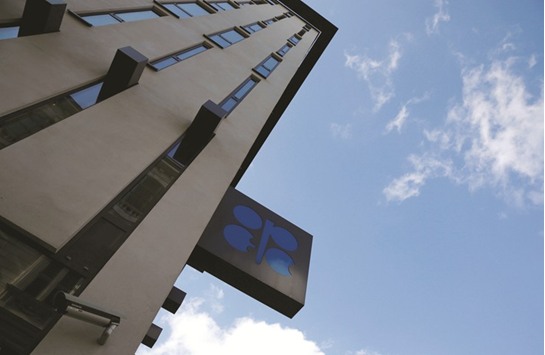Opec wants oil inventories to decline further and is working to ensure a policy-setting meeting in May reaches consensus, the group’s secretary-general said yesterday in comments pointing to an extension of a global supply cut.
The Organisation of the Petroleum Exporting Countries, Russia and other producers originally agreed to curb production by 1.8mn bpd for six months from January 1 to support the market.
Oil prices have gained support from the pact but a supply glut has been slow to shift, limiting their increase.
As a result, Opec members including top exporter Saudi Arabia have signalled support for extending the deal at a May 25 meeting.
Opec secretary-general Mohammad Barkindo, speaking at a conference in Paris, and other officials from Opec countries said the oil market was moving towards a balance between supply and demand with the help of the agreement.
“While it is evident that the market rebalancing is now moving forward and investment specifically in short-cycle projects is returning, it is essential we do not take our eyes off our desired goals,” Barkindo said. “We need to see the global stock overhang move closer to its five-year average.”
Barkindo did not comment directly on whether the cut would be extended, but he said efforts were under way led by Saudi Energy Minister Khalid al-Falih, who is Opec president in 2017, to get a consensus before ministers meet next month in Vienna.
“We are confident that the collaborative effort of Minister Khalid al-Falih and other ministers...will eventually facilitate a successful conclusion of the meeting in Vienna on the 25th,” Barkindo said.
Al-Falih met his Azeri counterpart Natig Aliyev and both agreed to support continuing the production cut agreement that was signed in December, the Saudi Energy Ministry said on its Twitter account yesterday.
His views were echoed by the oil ministers of Opec members Iraq and Angola, and the head of Saudi Arabia’s state oil company, who were also attending the Paris conference.
Iraqi Oil Minister Jabar al-Luaibi said production cuts were gradually leading to a long-awaited rebalancing of the market.
The output curbs, two-thirds of which are from Opec producers, are aimed at clearing a supply glut that has depressed oil prices.
Iraq last year asked to be exempt from cutting output, raising doubts over whether it would comply with the Opec deal or wish to extend it.
But al-Luaibi said yesterday Baghdad would go with the consensus reached by Opec.
Angola’s oil minister, José Maria Botelho de Vasconcelos, said he believed the deal would be extended beyond June.
Opec and the outside producers are trying to erode a glut that is keeping prices at less than half the level of mid-2014, cutting producer oil income and reducing investment in new fields.
The International Energy Agency said in its latest monthly market report that oil stocks in industrialised countries stood at around 3.06bn barrels at the end of February, a figure that mostly includes crude and oil products.
Stocks were some 336mn barrels above the five-year average, the Paris-based IEA said.
Oil market rebalancing after
Opec-led cuts: Aramco CEO
The oil market is moving towards a balance between supply and demand with the help of an agreement reached between Opec and other producers to cut production, the chief executive of Saudi Aramco said yesterday.
The Organization of the Petroleum Exporting Countries, Russia and other producers agreed to cut output by 1.8mn bpd for the first half of 2017, although persistent high global inventories have depressed oil prices.
Opec meets again on May 25 and is expected to extend the pact until the end of 2017 in a bid to end the supply glut.
“The market is moving toward rebalancing,” Aramco’s CEO Amin Nasser told a conference in Paris. “I see the oil market pointing upward and expect it to continue improving.”
“This returning confidence is being driven by improving fundamentals, and accelerated by the production agreement reached last year,” he said referring to the OPEC-led cuts.
Despite short-term volatility in oil prices, he said there had been “a rapid drawdown of floating storage during the first quarter of this year.”
Oil prices dipped yesterday, weighed down by concerns about globally bloated markets, but traders said prices seemed to have found support around current levels.
Brent futures, the international benchmark for oil prices, were down 50 cents at $51.32 per barrel at 1025 GMT yesterday, but remain above the $46 price level where they traded in late November just before Opec announced plans to cut supply.
Nasser said the oil industry needed to continue investing in long-term project despite short-term price volatility.

The Opec logo is seen at its headquarters in Vienna, Austria. Opec members including top exporter Saudi Arabia have signalled support for extending the output cut deal at a May 25 meeting.


